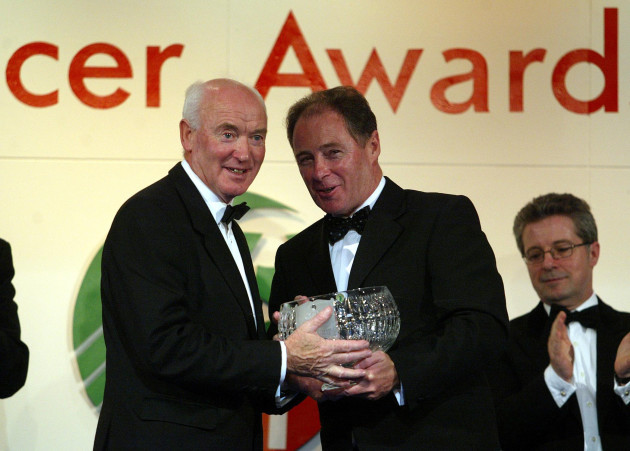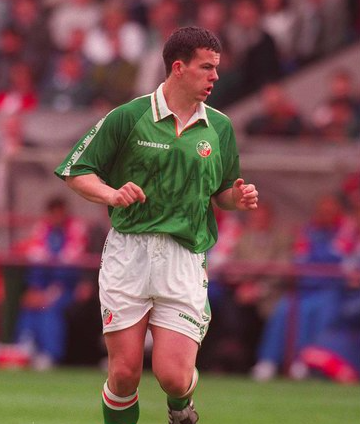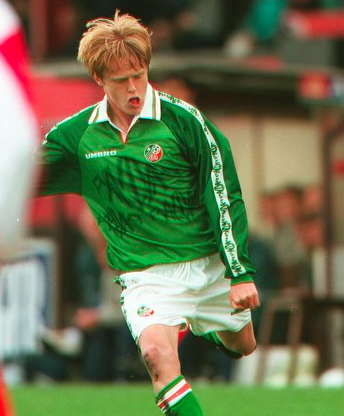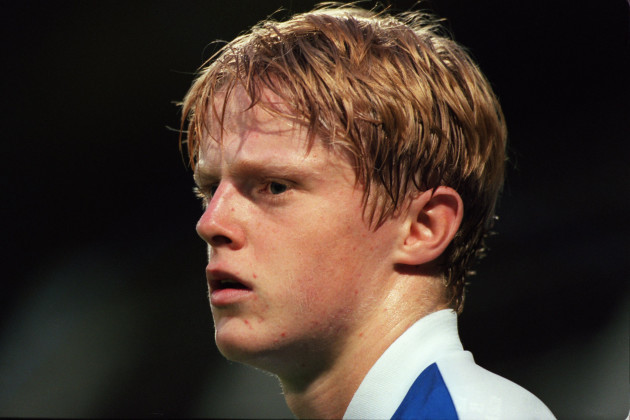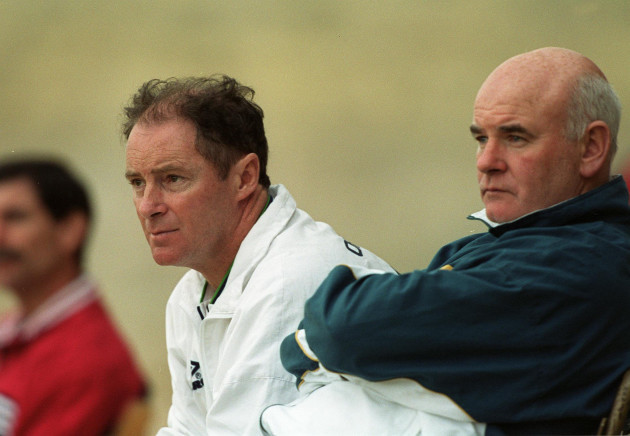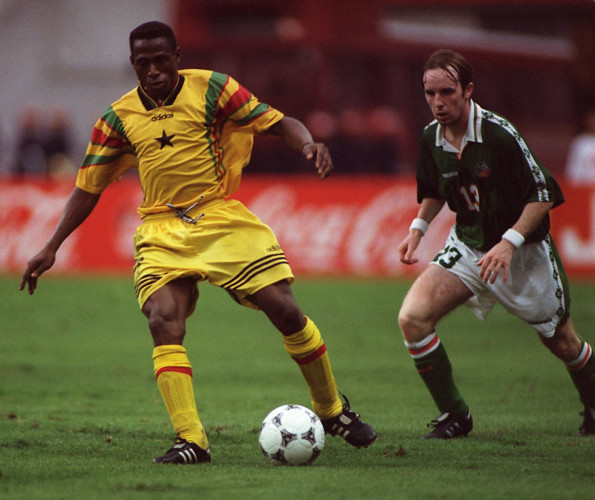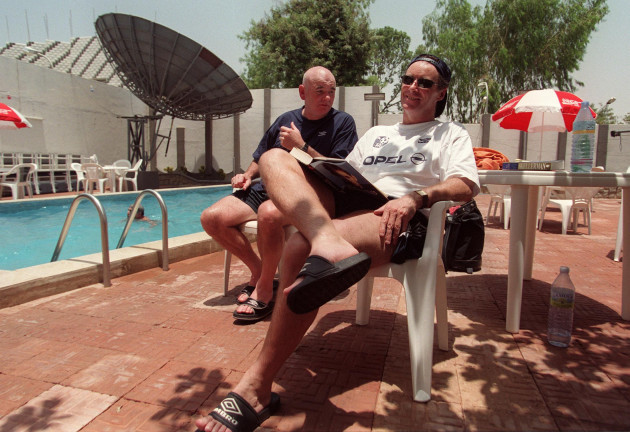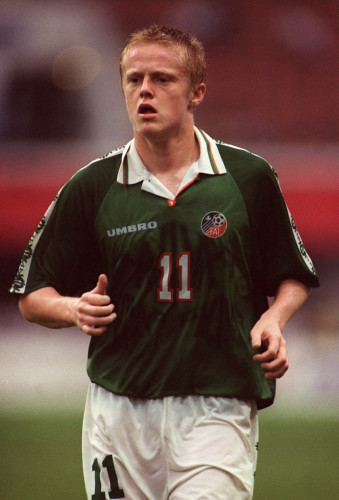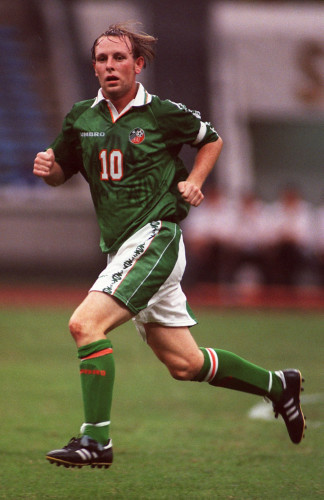THERE’S A MOMENT during my conversation with Brian Kerr when I catch my reflection in the window alongside me. My face is scrunched up, contorted and I know why.
Kerr is discussing the months before and after he took over as Republic of Ireland youth team manager. He reels off games, results and the finer details of group dynamics across a multitude of age-groups from two decades ago. As he’s talking, I wonder just how all of this information stays with him and gets recalled so easily.
But, inadvertently, he’d already answered that when dispelling the myth of having submitted a last-gasp CV to the FAI for their consideration at the tail-end of 1996.
“I think there was too much made of that,” he says.
“I’d worked with Liam Tuohy and Noel O’Reilly where we had five great years with the youth teams in the early-1980s – three European Championships and one World Cup. Our time finished with the Charlton thing and I eventually went onto Pat’s. But during that time I would’ve been keeping an eye on the youths’ results and I dealt with players who should’ve been in the international youth teams but weren’t. Compared to what had been done in Tuohy’s time, the youth teams appeared, to me, to be a bit of a shambles. I was conscious of that. The FAI had advertised the job and I decided to apply for it.
I had been thinking about applying but I loved my job as a lab technician in UCD and I loved being manager of Pat’s. Nonetheless, I decided that if I got the chance, I’d try and put the youths thing right – try and put it into order and give it the respect it deserved.”
There were different people in charge by that stage. Charlton was well gone. Maurice Setters was well gone. It was a different setup. Different leadership in the FAI as well. Bernard O’Byrne was General Secretary. I didn’t know him well but I knew of him and he was from the same area as me and went to the same school as me for a while. I knew he played football, that he followed Pat’s and that he played and managed and pretty much formed Belgard Athletic and they’d done very well in junior football. My concerns? I just thought somebody should be managing the youth teams who cared about it.”
For Kerr, it came down to duty of care. That the development of young Irish players wasn’t something that should only happen at their clubs. There was a responsibility and a desire to properly give talented youngsters a chance to step up to as grand a stage as possible. Because, Kerr recognised there was plenty of talent out there. He’d spent a long time being exposed to it.
And that’s something Kerr is keen to correct: the myths about Malaysia twenty years ago. Firstly, that the coaching staff were as new to it all as the players around them.
“It’s what a lot of people forget when they talk about the youths and the success we had,” he says.
Noel (O’Reilly, his assistant) and I were very experienced. We had five years with Tuohy who was a great mentor but we also had, in our own rights, been managing and coaching for years. Noel had worked with John Giles and Ray Treacy and Paddy Mulligan and Dunphy at Shamrock Rovers – he coached the first team and youths and had taken training. He’d worked with Belvedere for years. I’d been managing teams at various levels for a long time before I applied for the Irish youths job.”
There was a steely determination to Kerr’s approach and he backed himself from the off.
“I knew how I was going to go about the job myself,” he says.
There may have been an Under-20 World Cup on the horizon but Kerr had other priorities. He was now responsible for four different age-groups and one, the Under-18s, were still involved in a qualification campaign for the upcoming European Championship. On his extensive list of things to do, Malaysia would just have to wait.
“I had to get on the road very quickly,” he admits.
“I had been completely absorbed with trying to win things with Pat’s so I didn’t know anything about the Under-20 team. There were lots of players to be assessed and evaluated – by me – but then the matches started to come thick and fast. One of the first games was a friendly against France at Under-16 level. We had a tournament at Easter in Porto with the Under-18 group. Then, we had a two-legged play-off with Norway to get to the Euros in Iceland. So, there were lots of different teams and players and a lot to get stuck into”.
Finally, with a World Cup beginning in June, Kerr got a group together in the first week of May for a friendly against Belgium. But, for various reasons, there had been a lot of chopping and changing. Some players were eligible but unavailable. Others were injured. And Kerr also wanted to give players based in Ireland a chance to impress too.
“I had a trial match in Belfield for all the home-based players that I thought could’ve been in contention for a place”, he says.
“That was on 5 March. We used anyone we thought was good enough and I had 28/30 players there that night – good quality players. Out of that group, I would’ve taken Aidan Lynch, Trevor Molloy and Dessie Baker, who had just come back from Man United. That was a very useful process, getting a good look at them against each other. I was able to compare the best players in Ireland in that age-group.”
Kerr also had some higher-profile players that qualified to feature in the tournament but who didn’t end up on the plane to Malaysia: Ian Harte, Kevin Kilbane and David Connolly.
“At the time they were in and around the first team at their clubs,” Kerr says.
“I don’t remember much conflict. I just remember being told they were injured. I think Kevin had an operation that summer and it’s to his eternal regret that he missed out on the competition. After a while I became better at fighting with clubs to release players and reminding them of the rules and it was one of the things we got good at: making sure we always had the best squad available to us. Those players had a profile and would’ve been considered important players if we’d had them. But we didn’t have them so we just got on with it.
There were lots of things happening. I was going to move Alan Maybury up to the next group but he decided to wait for the finals of the Under-18s as well – they were happening in July. He didn’t think that if he played two tournaments in the summer that he’d be fresh for Leeds for the following season so he was another one that counted himself out. Richard Dunne was another one I considered but he was injured. And there was another lad – Derek Coughlan from Cork – who had just come back from Brighton and he went back to school. His Leaving Cert was on and I advised him that he’d be better off to do his Leaving Cert for his long-term future than come to Malaysia. He was in contention but he agreed with me, that it was the best thing to do.”
The turnaround was incredibly quick. Following the Belgium friendly in early May, Kerr had the bulk of the squad that would end up going to Malaysia. But, although some already knew each other, it was still a random assortment of faces. A week-long training camp in Limerick was arranged while Kerr mulled over some final decisions.
“We played a Cork selection on a Tuesday night and a Limerick selection two days later,” he says.
“We came back to Dublin on the Saturday and played the United Arab Emirates later that night in Drogheda, who were also going to the World Cup, and we drew 2-2. Then, I had to make a final selection. The next weekend I had them back in and we were leaving on the Monday to go to Malaysia. So, it was a very quick process. There were lots of other teams going on and the focus wasn’t only on the Under-20s. It meant there was a crossover with some of the players. I didn’t have much time to assess everybody that was eligible for us but I did the best I could.”
And through all of Kerr’s forensic research, one younger player had already stood out.
“When you’re younger and you start following the game intensely, you learn about evaluating players and qualities,” he says.
“There are things that catch your eye that are hard to explain to anyone else. I think I had that, I developed that from going to so many games as a kid. But sometimes you see fellas and a blind man would know they have something special about them. When I saw Damien, I said, ‘My, God – he looks very special’. That was instinctively my reaction.
He was in the Under-18s group and I saw him in a game against Poland and he was outstanding. When we went to Porto for a tournament, we played three games and he was brilliant. In the play-off with Norway, I was thinking he might be good enough to make the step-up to the next group. We won 2-1 away from home. Damien was beating so many Norwegian players so often that the Norwegian fans were laughing at his trickery. Imagine? In Bergen! It was just brilliant. The only question was whether he was physically strong enough for it. Then in Limerick, after the first training session, I had no doubts about that.
It’s only exceptional players that get into the first team at 17 or 18. You think of Wayne Rooney or Lionel Messi or even Damien when he was a kid. In the last match of the 1996/97 season Blackburn played him in the first-team. But those players need to be technically exceptional and mentally tough to take the physicality too.”
But Kerr is quick to point out that while Duff was a standout individual in Malaysia, there were plenty of others in the Irish squad who were good, solid players and could easily have played to the highest level. But, in a ruthless environment, a bit of good fortune can turn things around completely.
“I didn’t know how far they’d go in the game,” he admits.
“Because it’s often about getting a lucky break. Getting a chance in the first team, getting an opportunity, a manager liking you, being at the right club at the right time. And you don’t have influence or control over that as an international manager. A lot of those players could’ve done a lot better if they got the break at clubs. But unfortunately, a lot of them were on their way out of clubs when I got them. They were in that period where you think you’re a bit of a failure because you’ve been released and you haven’t made the first team. And then Malaysia came along and it was a restart for a lot of them and a chance for them to regain their confidence.”
Much has been made about the team’s stint in Limerick and Kerr’s approach to dealing with the finer margins, like the players sitting in saunas with rain-jackets on, trying to acclimatise to the intense, suffocating Malaysian heat. The anecdote is usually delivered in a light-hearted way, with the intent of raising a few laughs. But Kerr is fiercely protective of the preparation he and his staff dedicated themselves to. Essentially, doing the best they could with the resources available.
“There’s a lot of smart-alecky stuff about that,” he says.
“I was getting the best sports science advice around from the NCTC – the National Coaching Training Centre – that the late Pat Duffy was in charge of, who was a great guy. Giles Warrington was there, who has been with Olympic athletes over the last number of years. He was at the heart of sports science. He was a real practical guy in terms of what could be done with such short notice. I would’ve spent a lot of time with him, trying to replicate the conditions we’d face in Malaysia, which were horrendous for an Irish team.
Also, how could we prepare for those conditions? Even something like the travelling. I remember, before the tournament, seeing the US team playing a friendly in Tolka Park against a League of Ireland side. They were traveling around for months playing in different countries. Similarly, the UAE – prior to facing us in that friendly – had spent months playing in various places and having various training camps. That was typical of the resources some countries could put into it. We weren’t in that situation. We had to make do with what we had.
Also, I was working in science at the time in UCD – in chemistry – and I was very aware of sports science and understood the value of it – the metabolism, the body. People might pour a bit of scorn on it or we might’ve had a laugh about the idea but there was a method to it. We insisted players had to wear full clothing every day. Big jumpers over their t-shirts and the rain coats too. And it was as warm a summer as we ever had. We had rehydration breaks and we even tested different drinks to see what the lads thought were the easiest to take on a consistent basis. And the players even worked on making them up too because it was Gatorade we’d get it in powdered form. They’d make it up in 20 litre drums and then dish it out during training – each player had their own bottles. The sessions had a lot of tactical work. Short, sharp pressing sessions. Periods where we’d sit in, make sure we were nice and compact. We’d work on counter-attacking plays – making sure it would lead to a shot or a goal, if we could. Like, it wasn’t by chance or by luck. It wasn’t, ‘Ah sure, we’ll play it off the cuff and see how it goes’. We had a measured plan.”
Another reflection on the lack of resources available to Kerr and his team came when they arrived in Malaysia and checked into their first hotel in Alor Setar. Quickly, it became obvious that the standard of food was going to be a problem.
“We didn’t have the resources – or at least they weren’t provided for us – to have our own chef,” he says.
“In 1999 in Nigeria, we did. And we should’ve had one in 1997. In the first hotel, there was too much leaving food out under small heaters and leaving it just sizzling away. A lot of the players and staff suffered with sick tummies. Derek O’Connor was in bed for two days and missed the second match. But we had the back-up of a lot of carbohydrate stuff we brought with us and there was sweets and jellies, like Wine Gums. There was plenty of food around to survive – it was just that there was always a danger of ending up with a sick stomach. But once we got to Kuala Lumpur and Sarawak, the facilities were more modern so everything improved. But it was a big problem for us in the early stages.”
Given the circumstances, it was little surprise when the Irish side lost their group opener to Ghana – a team that had been crowned champions at the Under-17 World Cup two years earlier. Something Kerr describes as ‘an exceptional achievement’. But, as has been well-documented, the players rallied and dug deep to make it to the knockout stages.
Kerr admits that even that was a huge triumph.
“Six European teams qualified for the World Cup,” he says.
“From those six, we would’ve been the sixth. So, getting through the group was a major thing for us. I was confident that with a little break, we could get out of the group. And getting the draw with China in our final game, holding on with 10 men after Derek was sent-off, that was big. It was vital. We were under pressure. Their keeper was incredibly agile, he used to come out long distances and catch everything. And he’d race out and launch it out with a massive throw or boot it upfield. They had a lot of tall players and we were hanging on. So, getting through that was massive.
We were adapting to the conditions. We were doing very little training between games. We were keeping players who didn’t start ticking over. We were trying to make the players enjoy it more. By the time we got to Morocco – who were the African champions – we were getting confident that we could keep going. But it was always on the edge. We never had a game where we won 2-0 or 3-0. It was never comfortable. It was always tight.”
Mars bars, diarrhoea, Connect 4 and a once in a lifetime triumph: an oral history of Malaysia ’97
Still, Kerr could rely on a belief and a special camaraderie that had developed off the pitch. Considering the way the group came together – assembled very quickly and with some players getting their very first taste of representing their country – it’s astonishing that such a strong bond and spirit was crafted pretty effortlessly. But, again, as Kerr is quick to point out, it didn’t happen by accident. Because Noel O’Reilly made sure it didn’t.
“He’d take out the guitar at times and you’d think, ‘Isn’t that great?’
“I can remember one training session in Malaysia between matches. It might have been between the Morocco and Spain games. It was really hot – maybe in the high-30s. We made a decision to have a very light warm-up, then a little bit more intensity and then play a game – but only 10-minutes each way. But we stopped it after about five minutes of the second-half.
Thomas Morgan came up to me and said, Ah, c’mon Brian – give us another few minutes, will ya?’ And I said, ‘No, just keep it for the match, right? Listen to me. Keep it for the match.’ And that was always our motto: ‘Keep it for the match’. And Noel said, ‘Look Thomas, that’s it – training’s finished. We’re going to sing a few songs.’
Someone had put the guitar on the bus. So it was taken out. And there’s a great picture of all the lads sitting in the shade. There was a clubhouse at this training ground. Almost like the steps of Leinster Cricket Club, y’know? That old, wooden dressing-room. And the lads are sitting in the shade, under the veranda and sitting around Noel as he’s singing a few quiet songs. And that would’ve been it for about 15 minutes and then, ‘Right, back on the bus’ and back to the hotel. And it was extraordinary, it was beautiful and it was also effective in terms of the morale of the team. The training didn’t need to be too intense anymore. We just needed to keep them ticking over, conserve their energy so we had to be careful in terms of protecting them. That was one part of it that was him. And he was brilliant at it”.
Kerr is reluctant to discuss a definitive turning point, saying that everything was about a ‘game-to-game’ approach. But a passage of play from the victory over Morocco – which was achieved through Duff’s magnificent golden goal – is subsequently described in great detail.
“After Derek’s sending-off against China, Paul Whelan came in against Morocco,” he says.
“Their centre-forward was clear through in extra-time and Paul made a one-v-one save, blocking it with his body. And then we broke. Within a minute, Damien had got the winning goal and we were through. You could say it was a turning point because we’d won a knockout game.
And the first Golden Goal ever in a Fifa competition. It was an extraordinary end. We knew it was over because it had come so near to going the other way. I had the time to watch the centre-forward going through and I remember thinking, ‘God, isn’t it incredibly harsh that we don’t get a chance to equalise?’ But when it happened for us we weren’t half bloody pleased with the rule. It was bedlam but such a lovely moment. Sticking it between the lad’s legs and then caressing it to the far corner. Such a beautiful goal. And that was Duffer again. He had that lovely innocence about him. All the lads loved him – he was the youngest but had that innocence and they even loved watching him in training. He was so outstanding. The wizardry of his dribbling with the ball. It didn’t really matter who scored…but there was a certain joy about Duffer’s style that everyone loved. And it was old style wing wizardry in a more modern game. We’d seen it before but delivering it at a World Cup, on a strange pitch – which they painted green over the gaps – it wasn’t always easy to control the ball in those conditions.”
Though the adventure ended with semi-final defeat to Argentina and restarted once more with the victory over Ghana in the 3rd/4th place play-off, Kerr is immensely proud of a lot of things that happened in Malaysia. But perhaps the biggest thing is the way his players stuck to and carried out a particular brand of football. Kerr and O’Reilly wanted their teams to have an identity, to create, to be positive.
Looking back, the players followed those instructions to a tee.
“There wasn’t a minute of it that was easy,” Kerr says.
“But it was always composed. Even when we were under pressure, I thought our back-four – Micky Cummins, Colin Hawkins, Dave Worrell and Robbie Ryan were always very calm. They weren’t vociferous. But they were good organisers and that calmness helped us. Thomas (Morgan) was the leader and dictated the style of play. We played through him, he built it up, passed it, got it back, played short or long – if it was on – and dictated to the others how we’d play. And he’d get up in support of the front men.
Micky scored from a shot on the edge of the box and then from a corner we’d worked on. The construction of the goals against Ghana…there was a lovely passing move between Thomas and (Alan) Kirby before Thomas played the pass for Damien. There wasn’t one goal when it was bang it up the pitch and see how we’d go. There was no point. We had to play it into feet. Neale could link play, Dessie was energetic, Niall Inman, Kirby and Damien would’ve ran and ran all day for you but they were astute, cute and clever with the ball and used it well. Which was crucial in terms of giving the defenders a breather and a break and keeping the game at a tempo that we could stay with.”
We’ve chatted for over an hour and it’s time to go. Afterwards, I sit back and digest the conversation. The detail, the passion, the authority. But there’s something else that strikes me.
Last Friday week, there was a reunion in Dublin to celebrate twenty years since the Under-20s’ success in Malaysia.
It wasn’t an official FAI function. It wasn’t a PR stunt. It happened because Brian Kerr wanted it to happen. He organised it. Nobody else. Two decades later, he wanted these players to be lauded for what was an astonishing achievement. He wanted them to get the respect they deserve.
He is still obsessed with that duty of care that motivated him to apply for the youth team manager’s job in 1996. That responsibility to the talented young players who have represented their country with such dignity and humility and who brought such happiness to so many.
To still retain such a passion for something after so long is truly special.
The42 is on Instagram! Tap the button below on your phone to follow us!

